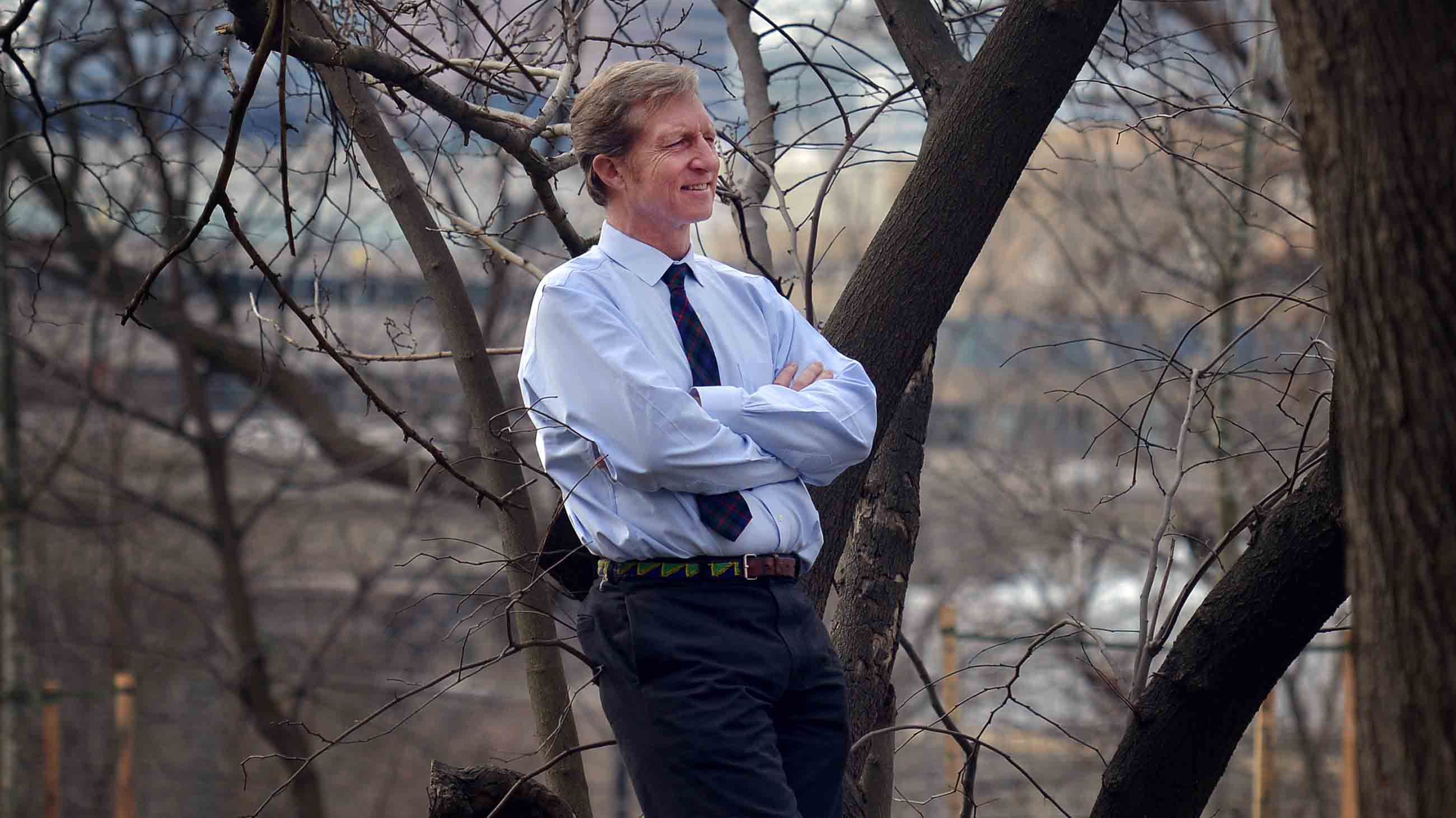Five Questions for Tom Steyer
NextGen Climate is a left-leaning, San Francisco-based environmental advocacy and political action committee founded in 2013 by billionaire former hedge fund manager and staunch Democrat Tom Steyer. Since leaving the investment industry in 2010, the 59-year-old New York City native has become a leading figure in environmental and climate causes — and a key underwriter of Democratic political ambitions: He and his wife Kathryn were the top individual donors during the 2016 elections.
That obviously didn’t pay off, but Steyer’s interest in pushing for dramatic action on climate change has not waned, and he admits to being baffled that the issue remains so politically polarizing in the United States. “There’s this sense that climate change is sort of an elite issue,” Steyer says, “that it’s not a meat and potatoes issue. Real men don’t eat climate change.”
They really should, Steyer believes. Tackling climate change is something that businesses, religious leaders, and even security experts have already embraced the world over, and it’s inexplicable that Republicans in the U.S. continue to ignore or dismiss it. “If you think about it, big business in America [has] moved on this, with the exception of oil companies — they really have,” Steyer says. “The pope has moved on this. The joint chiefs of staff have moved on this. It’s sort of like, who are the Republican icons that we don’t have?”
Steyer’s goal with NextGen is to motivate young people to vote and make their voices heard on climate change, including sponsoring and promoting last month’s People’s Climate March, which attracted an estimated 200,000 demonstrators to Washington D.C., and thousands more to satellite marches around the world. The well-heeled activist has also spurred speculation that he might make a run for office himself, perhaps for the governorship of California next year.
On this front, Steyer remains coy, and he insists that his main focus right now is on NextGen and assembling armies of young people to oppose what he sees as the new administration’s recklessly cavalier view of climate science. Undark recently had a chance to catch up with Steyer to talk about those efforts, including why he sees the Millennial generation as being uniquely poised to ultimately drive and deliver the sort of meaningful climate policies that have eluded American leadership for decades.
Our conversation has been lightly edited for clarity and length.
UNDARK — Can you talk a bit about the role that you see young people playing in Trump’s first term?
TOM STEYER — I feel like Millennials are very knowledgeable on the issues, pretty darn passionate, but have a low propensity to vote. So the question is, when do the Millennials start saying, “No, this totally stinks. This is not right!” Because it isn’t. It’s sort of funny because young people are really the most progressive group, but you don’t have the largest participation.
There’s a big argument here. I don’t know if this argument is going to be made or if it’s going to be something that moves American politics or not, but your generation is going to inherit this huge climate problem, a huge amount of debt, underfunded Social Security, underfunded Medicare — our generation continues to do the most selfish things I can imagine.
UD — There are so many aspects of the climate problem that seem to trigger deep political feelings and reactions. Is it possible to depoliticize climate change and make it more of a human issue?
TS — What we’ve always said is that people only vote on local human issues, which are jobs, health care, clean air, and threats or advantages to their family. Those are the only things that people vote on, so that’s what we have to work with. And if you’re a Millennial, it’s really hard to believe that this is not going to have a gigantic impact on you. Even if you don’t believe in climate change, you know you have to do something when there’s water in your living room.
UD — So what do you think is the key to bridging the gap between public policy makers, scientists, and citizens? Do you think identity politics plays a role?
TS — I think it’s all citizens. I think that if the citizens insist on getting their way, they will get their way. It can’t just be because they agree, because they already agree if you look at the polls. But if you’re not going to change your vote, it doesn’t matter what you think.
Climate change is not high enough on the priority list, it’s got to be one of their top three issues. Because who votes on their fifth most important issue? No one. Most people have one or two issues that they really vote their conscious on, and then there’s money. Money’s really about votes too. I think basically Republicans are selling out the country because they want the money from the oil and gas industry because they don’t think they’re going to lose any votes by being on the wrong side of this issue. I don’t think any Republicans are going to change their vote.
UD — There’s been talk of running for governor in 2018, but you said those plans are now on hold. How do you see your personal work and your role changing or remaining the same over the next few years?
TS — Obviously, I was surprised that Trump was elected. I thought we were going to be in this world of trying to figure out what to do in the context of a Clinton White House. I thought we were going to be in a data driven traditional American democracy with full rights for citizens and a sense that America is going to be the free leader of the world.
So I’ve been trying to figure out, given what our goals are — which are really to support a really different set of values than the Trump administration’s values —what is the most effective way to do that from my personal standpoint?
That’s why I said we need to change course, because apparently, that’s not the case, those are all off the table. It seems like on every single important issue, we’re not just in a different place, we’re in a radically different place.
UD — Are you more hopeful or fearful for what his administration may bring to the table?
TS — Both. Did I really think that someone who provided the context for fairly straightforward bigotry like Steve Bannon would be a senior adviser in his administration? No, I did not. Did I think that the head of the EPA would be somebody who’s a climate denier? Did I think the person in charge of the Energy Department would want to abolish the Energy Department? Did I think that the head of Exxon Mobile would be the Secretary of State? Did I think that half the Cabinet would be generals? No.
But I will say this — you don’t totally want to live in a completely bland time. So there’s a chance to be involved in super exciting and important issues. I think you have to take the attitude that it’s more threatening, but that will make it more interesting.
CORRECTION: This post has been updated to correct the name of Steyer’s wife, which is Kathryn, not Karen.











Comments are automatically closed one year after article publication. Archived comments are below.
From ClimateDepot.com, “Renowned Princeton Physicist Freeman Dyson: ‘I’m 100% Democrat and I like Obama. But he took the wrong side on climate issue, and the Republicans took the right side’
Nobel Prize-Winning Scientist Dr. Ivar Giaever, Who Endorsed Obama Now Says Prez. is ‘Ridiculous’ & ‘Dead Wrong’ on ‘Global Warming’
Green Guru James Lovelock reverses belief in ‘global warming’: Now says ‘I’m not sure the whole thing isn’t crazy’ – Condemns green movement: ‘It’s a religion really, It’s totally unscientific’
“He and his wife Karen were the top individual donors during the 2016 elections.”
don’t believe that’s her name.
“Steyer, Thomas & F. & Kathryn Ann
Fahr LLC/Tom Steyer
San Francisco, CA”